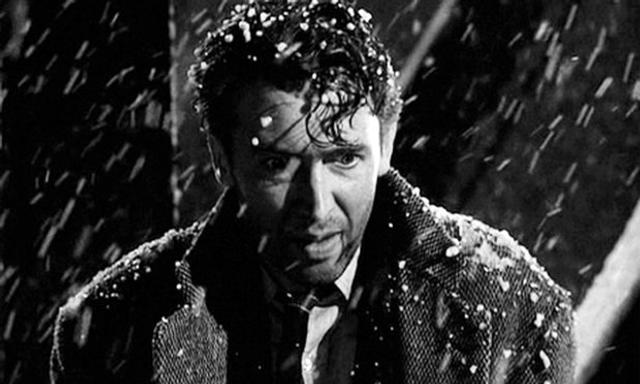‘Tis the season to be jolly goes the phrase, and with this comes whipping out the DVDs of your favourite Christmas classics or watching them on the telly. Upon the insistence of your mam, you’ve probably seen Frank Capra’s 1946 beloved It’s a Wonderful Life at some point. People generally find its ending uplifting and believe it captures the true meaning of Christmas. But actually the film isn’t that wonderful, and it certainly isn't feel-good.
We’re here to tell you that It’s a Wonderful Life, without necessarily saying it’s a bad film (it is a good film), is actually super, super depressing. This is why:
1. George Bailey spends the entire film compromising his happiness
George Bailey (played by the iconic Jimmy Stewart) is essentially a walkover. He constantly puts other people's needs before his own and basically gives up his own happiness and desires for the self-centred people around him. The film teaches the values of selflessness, arguably, but also says you should give up your dreams and settle in life - ambition is a bad thing.
His reason for marrying Mary seems to be mostly because she loves him and he doesn't want to let her down, he takes over the family business even though he has other, bigger dreams for himself, and he even sacrifices the money for his honeymoon for the, frankly, small-minded townspeople of Bedford Falls. They say you have to be happy in yourself before you bring joy to the world, and we see just how unhappy George gets by always sacrificing his desires.

2. Everything gets really sad
I mean really sad. The scene where he lashes out on his family is heart-breaking, and then he contemplates suicide. One could use the whole darkness before the light argument, but still - even before George goes to the bridge, his father dies on his graduation night and we witness him being beaten as a child. How is this Christmassy again?

3. George never gets to leave his hometown
If you look at the film through George’s perspective, It’s a Wonderful Life is basically about George attempting to leave his hometown to move onto bigger things, but gets thwarted every single time he’s close to leaving. He is basically trapped like an animal so it’s no surprise, really, that he eventually just gets sad and annoyed at those around him.
But it teaches you the values of home and family, doesn't it? More like it teaches you to never carve a path for yourself and to, God forbid, never go out and actually get to experience the world (remember, George isn’t even able to go to college because his father dies and he has to take care of the family business). Heck, if you do venture out, you may just come upon the Pottersvilles of the world, which brings us to our next point…

4. The world doesn’t look like Bedford Falls – it looks like Pottersville
Right, so It’s a Wonderful Life is also about the value of communities and small town values, allegedly. The idea that it should become a seedy place of loud noises, crime, bars and nightclubs is practically dystopian. But guess what – that’s city life, they're the times we’re living in now, and it’s a total downer to think that what is now our reality was the worst thing imaginable for the characters of this movie.
5. It’s not a Wonderful Life for women
The two main female characters in the film are Mary, played by Donna Reed, who eventually becomes George’s wife, and Violet (Gloria Grahame), who’s quite the flirt. In the Pottersville sequence, in which a world without George Bailey is imagined, Mary has become a spinster librarian (and poor Donna is made to look as unattractive as possible) while Violet is now a prostitute. So ladies, if you don’t have men in your lives to come and rescue you through marriage, they’re your potential fates.
Plus George is horrible to Mary at various points of the film when Mary shows nothing but pure, devoted love for him. Not cool.
6. It's A Wonderful Life is now being compared to Trump’s presidency
As if we couldn’t possibly have any more negative associations with the film, now a number of media outlets are comparing Potter to Trump and proclaiming that we’re now living in Pottersville. The sad thing is though, as we’ve pointed out, perhaps we’ve always been in Pottersville. And now more than ever, it just feels like there just aren’t any George Baileys left in the world.










































































